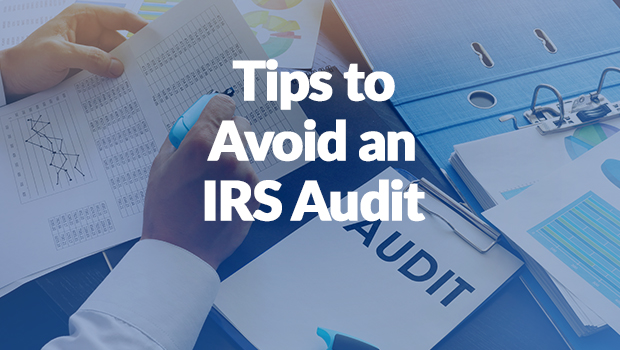Last month we discussed how to best survive an IRS tax audit. But wouldn’t it be nice to avoid the tax audit altogether? That’s the topic of this month’s blog post and in it, we’ll identify a few tips to prevent getting audited in the first place.
Tip #1: Be Honest With Your Taxes
This sounds obvious, but one reason people get audited is because they misrepresent their financial information. Sometimes, it’s a flat out lie, such as claiming a charitable deduction that never occurred. Other times, there might be a bit of fudging going on, like claiming a business deduction that’s larger than it should be. Either way, it could potentially raise a red flag with the IRS and trigger an audit.
Tip #2: Try to Avoid Using Round Numbers
When we spend or earn money, rarely do we end up with perfectly round numbers. Did you buy a new computer for your office? How likely is it that the total purchase price came out to $800.00 even? Or think about how unlikely it is that your unreimbursed medical expenses for the year will add up to exactly $27,500.00.
The more rounded numbers the IRS sees on a tax return, the more likely they will conclude that someone is either making up amounts out of thin air or they don’t know the exact amounts and are simply estimating values. Either situation raises the likelihood of an audit.
Tip #3: Don’t Complete a Tax Return By Hand
One of the triggers for a tax audit is if there’s an error with the calculations. This is far more likely if you do the math yourself instead of letting tax software do it. This isn’t to say tax software never makes a mistake, but it’s far more likely that you transposed two numbers when filling in tax forms or didn’t add up two amounts correctly.
Oh, and if you fill in the return by hand, there’s a greater chance the IRS will incorrectly read one or more of the numbers you wrote on your return. This misread could lead to an audit if it results in numbers not adding up the way the IRS expects.
Tip #4: Be Careful With Reporting Large Business Losses
If you’re completing a business return and you have a significant business loss, this increases the chances of an IRS audit. However, don’t worry too much if you have perfectly valid reasons for your losses and can support those reasons.
For example, you might be starting a new business, and therefore have a lot of start-up costs. Therefore, the IRS won’t be surprised if during the first few years of your business, you’re operating in the red. But if you’re a well-established business that seemingly never turns a profit, this might lead to an audit.
Tip #5: When in Doubt, Ask a Professional
If you’re not sure if you can claim a deduction or if your tax avoidance strategy is lawful, then that’s a good time to consult with a CPA or tax attorney. Depending on how much money is at stake, as well as the legal or financial ambiguity, it is often well worth the time and money to get the opinion of a tax professional.
And don’t discount the situation where what you want to do is perfectly legal and proper. However, there could be a certain procedure to use that you’re not aware of, but your tax professional is experienced in using. The biggest reason to use a profession is that you don’t know what you don’t know.
Kienitz Tax Law is here to help you with your tax issues. Schedule your FREE consultation today!

